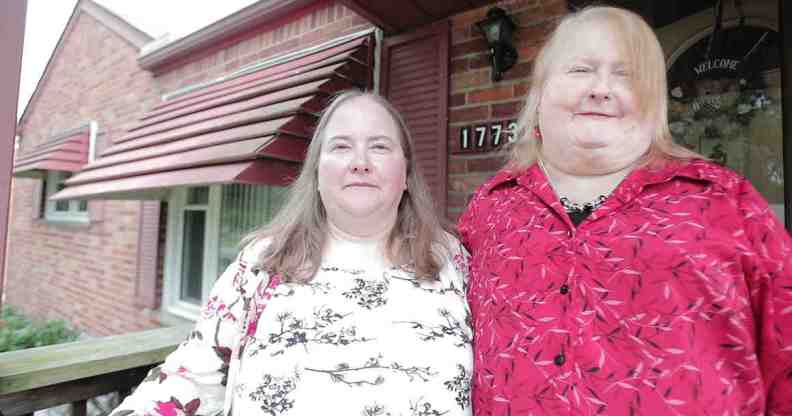Transgender woman at centre of landmark Supreme Court case: ‘I’m happy being me’

Aimee Stephens (right) and her wife, Donna. (ACLU)
Aimee Stephens, who was fired from a Detroit funeral home two weeks after coming out as transgender, says she is “happy being me”.
“It’s taken a long time,” Stephens told the Associated Press ahead of her landmark anti-trans discrimination case, which will be heard by the US Supreme Court on October 8.
Stephens, 58, worked for Harris Funeral Homes in Detroit, Michigan, for six years.
In July 2013, she informed her boss, Harris Funeral Homes owner Thomas Rost, that she was trans and intended to come to work dressed in clothing worn by women in the three funeral homes he owned.
Two weeks later, Rost handed Stephens a letter that said “this is not going to work”, Stephens told AP.
Stephens complained to the federal Equal Employment Opportunity Commission, which agreed to sue the funeral home. A trial judge ruled against her but then a federal appeals court in Cincinnati sustained her complaint, saying that discrimination on the basis of transgender status is sex discrimination.
That appeals court also found that she was fired because Rost had stereotypical views of women’s dress and appearances. But Rost appealed, and the Supreme Court agreed to hear the case.
“I felt what they did to me wasn’t right. In fact, it was downright wrong,” Stephens, who is originally from North Carolina, said. “But I also realised it wasn’t just me, that there were others in the world facing the same tune.”
Stephens, who is planning on attending the Supreme Court hearing despite having worsening health problems, said that she has no regrets about her complaint against Harris Funeral homes.
“With all the things that have come out, with the way that transgender people are being treated, basically trying to be forcibly erased from society, I have no regrets at all about it,” she said.
Her case will be heard by the Supreme Court on the same day as two other cases that also deal with whether federal civil rights law barring job discrimination covers gender identity and sexual orientation.
The three cases are the first involving LGBT+ rights since the retirement of justice Anthony Kennedy, the court’s LGBT+ rights champion.
Kennedy was replaced by Brett Kavanaugh who, during his Supreme Court nominee confirmation hearing in September 2018, refused to say what his opinion is of equal marriage.
In a August 2019 brief filed to the Supreme Court in Stephens’ case, the Trump administration said that it is legal to fire someone for being trans.
Stephens is being represented by the ACLU.

